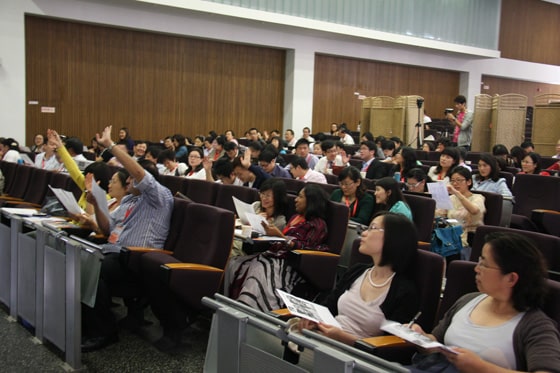I enrolled in the Peking University School of International Studies so I could learn the perspectives of China’s most prestigious college students. We Americans often have ideas of what the Chinese education system breeds. But aside from robust test scores on the math portion of the SAT and whispers that China lacks creative or analytical thought, little understanding of Chinese education has crossed the Pacific. So how do Chinese students view the outside world? Or, given recent events off the coast of Taiwan, how do those students view China? Last week, I got to hear a bunch of opinions at a class titled “Foreign Relations of the People’s Republic of China.”
The professor began class with an hour-long rant about the shortcomings of the Chinese education system. He claimed that even as they completed their PhD dissertations, some of his students had levels of thinking that had never progressed past the middle school level. He appealed to the merits of a critical approach, expounding, “You must learn to question everything!”
After some rambling anecdotes, the professor then turned to the blackboard and asked the class what they thought of China. Silence ensued. He appealed again to the room of 300 once again, finally eliciting a response, the tension condensing as the student first announced he was Japanese.
“I think China is a very … interesting country.”
Several students chuckled. But the trickle of opinions soon became a flood.
“I think China is a country that lacks confidence.”
“I think China is a country that loves face.”
“I think that given China’s size and diversity, it’s a country with relative peace and stability.”
“I think China likes to think it’s cute, but deep down, we’re incredibly hegemonic.”
“I think China is a place that no one can really understand.”
As the responses continued, students used flowerier wordings in increasingly hushed voices. Ambient conversation started to bubble until one girl from the back of the room took control when she grabbed the microphone, stood, and spoke with confidence.
“I think China is a place that has lots of delicious things to eat. Thank you!” The room erupted in applause.
Finally, the professor proposed his own definition: “China is Eastern, with an ancient history that includes foreign invasion, and is currently a large, developing socialist state.” He continued that according to such characteristics, the polar opposite of China is America: Western, short history, no foreign incursion, fully developed capitalist state (he admitted that it is large, at least).
I could not disagree more with the stance he took, which was not open for discussion at the time. America is not the polar opposite of China. We have a great deal in common, and oversimplified views, such as American or Western history being short, do little but tear apart any chance of mutual respect. But my Chinese classmates may come to those conclusions as well, as long as they question the words of the professor who instructed them.
我在北大国际关系学院上课是为了有机会接触到中国最优秀的学生的想法。身为美国人,我们经常有对中国学校的产品有偏见。可是除了默默地说,中国学生SAT数学分数特高但缺乏创造性和分析思考本领以外,很少有关于他们的教育方式的资料越过了太平洋。那中国学生是怎样对待国外的事件呢?或换句话来说,不忘最近在台湾海区的事时,学生们怎么对待中国呢?上个星期,我上中华人民共和国对外关系的课程时,有机会听到他们的意见。
开头时,教授争论了中国教育方式的缺点,讲了整整一个小时。他说,有些学生就算考上了博士文凭,还是没穿过他们的小学性的想法,思想根本不成熟。他强力地推荐疑问的思考方式,劝所有的学生牢牢记住:一定要学会凡事都得疑问的习惯!
说完他几个故事过后,教授转了身到黑板,问了课室他们对中国有什么想法。一声不吭,学生们静静地坐着。他再次问了这问题,终于得到了回答。这位勇敢的学生尴尬地宣布自己其实是个日本人过后,说"我认为中国是个。。。非常有趣的国家。"
几位学生笑了。可是这小点点的意见很快涨成洪水。"我觉得中国没信心。""我觉得中国爱面子。""我认为,考虑到她的大小和异样过后,中国其实挺平安,挺稳直的。""中国很喜欢自认为可爱,可是我们其实是非常霸权的。""中国是个没有人可以真正了解的地方。"
话可多了,选来用的词也越来越深奥,但声音越来越隐秘。终于,一位后头的女学生抢起了麦克风,有信心地说,"我认为中国是个有很多美食的地方。谢谢!"她得到了一场热烈的掌声。
教授提出了自己的想法。"中国是个东方的,有悠久历史的,被侵略过的,社会主义的,在发展中的大国。"他接着说,根据这几个条件来看的话,美国就是中国的极性相反:西方,短历史,从没被侵略过地已被发展的资本主义国家。至少他有承认美国也很大吧。
当时我们没这个机会来讨论这个话题,但是我非常不同意他的想法。美国不是中国的相反。我们俩之间有很多相似的地方,但是太过简单的想法(好像说西方或美国的历史短)只能把所有互相尊重的机会给毁了。希望我的中国同学也会断定到这个想法;但是他们得先疑问他们的教授们所教他们的道理。


